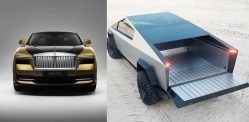Electric Vehicles make up just 0.1% of new car sales in India
British Indian billionaire Sanjeev Gupta has announced that his company Liberty House Group could bring F1 inspired electric cars to India by 2023.
GFG Alliance, which is run by the Gupta family, is building lightweight electric city cars for both India and Australia. The vehicles will be designed by former McLaren and Brabham technical director, Gordon Murray.
Murray’s design is based on the F1 cars weight reduction system, which sees lighter cars more cost-friendly as the production process is simpler. These new cars will allegedly cut the cost of assembly plants by 80%.
Gupta, the Executive Chairman of Liberty House Group, confirmed the news in an interview with Bloomberg:
“We are talking about city cars, about small, light, very, very, economical cars. We will launch both in India and Australia.”
GFG has been selected as the bidder for Indian auto parts maker Amtek Auto. This helps GFG’s auto car sales in India.
Mahindra and Tata motors are already in the process of manufacturing Electric Vehicles, with Maruti Suzuki and Toyota following in their footsteps in the near future.
Electric Vehicles make up just 0.1% of new car sales In India. The Indian Government aims to increase this by the time Electric Vehicles become prominent.
In September 2017, the Energy Efficiency Services Limited (EESL) gave the world’s biggest Electric Vehicle tender of 10,000 EV’s to Tata Motors.
This move is part of India’s plan to get off diesel and petrol cars and onto Electric Vehicles by 2030.
Public transport also aims to be 100% electric by 2030, however, there is no plan set-out to explain this in detail.
It was also reported that Nissan was working with the Indian government to introduce low-cost Electric Vehicles in India.
Japanese motorcycle makers Yamaha have also released a prototype based on Murray’s iStream design platform. The company showcased the MOTIV city car in Tokyo 2013 and is considering releasing one of the concepts in the near future.
India is not the only country receiving Electric Vehicles, but Australia is also on the list. GM Holden announced the closure of Australia’s last manufacturing plant, which according to Gupta creates an opportunity for EV’s in Australia.
An existing plant could help speed up the production process even more, but Gupta remains cautions, as he said:
“Launching a car is not a joke, it’s a big undertaking. If we are to do something with an existing plant, then it’ll be faster. Capital expenditure to enter production may be less than $500 million.”
The low costs of the Electric Vehicles and the use of an existing plant would help kick-start the electric car industry in Australia.
F1 inspired electric cars could be in India by 2020, but this time frame is dependent on the production speed. However, as electric cars become the future, it won’t be long before they take over the world’s vehicle markets.






























































